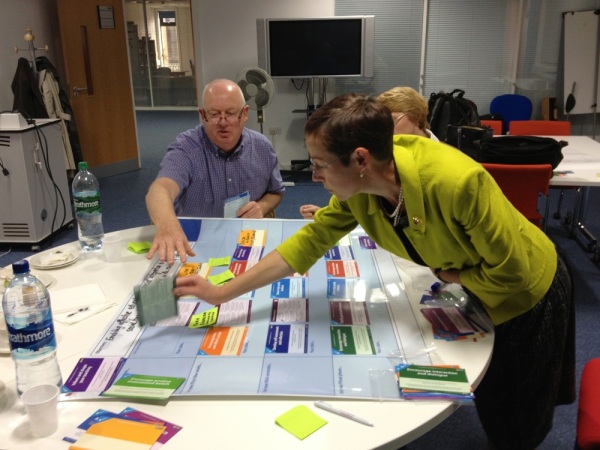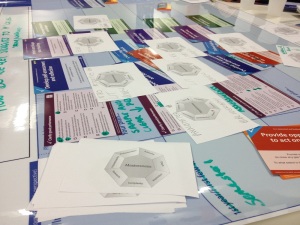Earlier today I was lucky enough to be invited to participate in a Viewpoints Methodology workshop organised by Heather Gibson of QAA Scotland and facilitated by Alan Masson of the University of Ulster.
It was great to be able to attend the workshop as I’ve followed the development of Viewpoints since it was first funded by Jisc, as my former Cetis colleague Sheila MacNeill was responsible for supporting the Jisc Curriculum Design Programme and also sat on the project steering group.
Alan Mason began the workshop by introducing Viewpoints Curriculum Design process and tools.
“Viewpoints created themed workshops and reflective resources to inform, inspire and help teachers, support staff and learners plan effective curriculum designs. These resources are focused around four main areas: assessment and feedback, information skills, learner engagement and creativity in the curriculum. Each theme is underpinned by well-established pedagogical approaches and has been designed to help teams build ideas towards a more learner centred curriculum design model. They provide a series of simple, user friendly reflective tools and prompts that promote a creative and effective approach to the curriculum design process and help practitioners think about important stages for their students at different points on the learner timeline”
Our activities today were centred on a couple of hypothetical course design scenarios and made use of resource cards based on my former CAPLE colleague, David Nicol’s REAP assessment and feedback principals. The Viewpoints methodology is centred on collaborative brainstorming and the process focuses on story boarding to encourage a dynamic creative process. Rather than creating specific outputs, Viewpoints workshops focus on facilitating transition and creating collaborative agreements.
For the first task I joined a group that chose to explore college – university articulation and the objective we agreed to address was to design a course that would:
“Enable effective educational and social integration to facilitate better social / peer learning experiences in the context of college / university articulation”
The whole process was really engaging and it didn’t take us long to create an innovative design that we all agreed on.
Meanwhile, the other group chose to focus on Masters students and articulated their objective as follows.
“How do we get students to Masters level being / working?”
For the second task I switched groups and joined the Masters group whose task was to explore how the learner attributes of “Masterness” (autonomy, depth, abstraction, complexity, research, unpredictability, professionalism) mapped on to the design structure.
Although we spent the afternoon working on hypothetical scenarios, all participants agreed that the Viewpoints methodology has great potential and we were able to suggest many different scenarios where the methodology could be employed in addition to curriculum design. These included developing institutional strategy, project planning and aligning courses to UK PSF descriptors. All in all it was a really valuable workshop, so many thanks to Heather and Alan for organizing and facilitating it!
You can find out more about Viewpoints from the project blog here: http://viewpointsproject.blogspot.co.uk/ and the Curriculum Design Workshop resources are available here: http://wiki.ulster.ac.uk/display/VPR/Home
Oh and one last thing, extra brownie points to the Viewpoints team for ensuring that all their resources are clearly marked with a Creative Commons licence!





